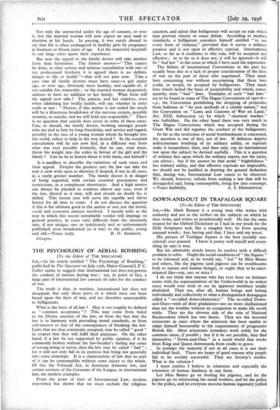Sta,--In his article entitled " The Psychology of Bombing," published
in The Spectator on July t5th, Major-General J. F. C. Fuller seems to suggest that international law does not govern the conduct of nations during war ; yet, in point of fact, a large part of international law consists of rules for the conduct of war.
The truth is that, in wartime, international law does not disappear, but only those parts of it which have not been based upon the facts of war, and are therefore unacceptable to belligerents.
What is the basis of all law ? May it not roughly be defined as " common acceptance " ? This may come from belief in the Divine sanction of the law, or from the fact that the law is in harmony with prevailing-moral standards, or from self-interest or fear- of the consequences of breaking the law. Laws that are thus commonly accepted, may be called " good " in respect that they will fulfil their purposes. On the other hand, if a law be not supported by public opinion, if it be commonly broken without the law-breaker's feeling any sense of wrong-doing or terror, then the law may be called " bad " ; for it will not only fail in its purpose but bring law generally into some contempt. It is a characteristic of law that no part of it can be contemptible without some injury to the whole. Of this the Volstead Act, in American domestic law, and certain sections of the Covenant of the League, in international law, are modem examples.
From the point of view of International Law, modem experience has shown that we Must exclude the religious
sanction, and admit that belligerents will accept no. rule which may prevent victory or cause defeat. According to modern standards, a belligerent considers himself entitled " to use every form of violence," provided that it serves a military purpose and is not open to effective reprisal. International Law, so far as it conforms to this rule, will be accepted and effective ; in so far as it does not, it will be ignored—it will be " bad law " in the sense in which I have used the expression.
The failure of international Conventions in the past has usually been due to a lack of proper consideration of the facts of war on the part of those who negotiated. They made laws concerning war without ascertaining that these laws could, or would, be accepted by belligerents. They made laws which lacked the basis of acceptability and which, conse- quently, were " bad " laws. Examples of such " bad laws " are to be found in some of The Hague Conventions of 5907-8- e.g., the Convention prohibiting the dropping of projectiles from balloons or " by new methods of a similar nature," and the Convention on " Laws and Customs of War on Land," Art. XIII, Subsection (a) by which " chemical warfare " was forbidden. On the other hand there was very much in The Hague Conventions which was accepted during the Great War and did regulate the conduct of the belligerents.
So far as the restriction of aerial bombardment is concerned, the question is one of fact, not of law. If defences deprive indiscriminate bombing of its military utility, or reprisals make it inexpedient, then, and then only, can an international law upon the subject be devised usefully. This is a question of military fact upon which the military expert, not the jurist, can advise ; but if the answer be that aerial " frightfulness " has military utility, and that effective reprisals are impossible, we should not be justified in drawing the general deduction that, during- war, International Law ceases to be observed. We should, however, refrain from making a law that will be disregarded and, being contemptible, bring law into contempt.


































 Previous page
Previous page